Harry Potter: The Importance of Antagonists
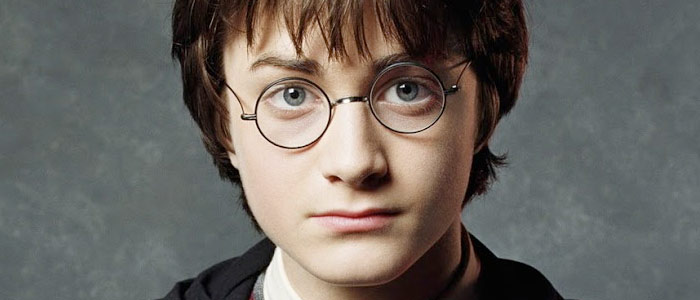
Without conflict, story doesn’t exist. The tougher the conflict and higher the stakes, the better a story will be. As readers, we hate to see the protagonists we love in trouble. We want them to get their happy endings, and we sympathize when our fictional friends get knocked down. Yet we keep reading because we want our protagonists to get up again. We want and need to know these people can solve problems and overcome obstacles because if they can, so can we.
This need for strong conflict in story begins when we are children. Many of us remember favorite books or series from our childhood and adolescent years. These books centered on memorable, sympathetic protagonists facing myriad conflicts that sometimes seemed impossible. For the current and coming generations, there is perhaps no better example than Harry Potter. At the tender age of one, Harry is nicknamed The Boy Who Lived, because he has already escaped Voldemort’s deadly murder plot.
In the course of seven books and sixteen more years, Harry faces several other antagonists and harrowing situations. Most are tied to Lord Voldemort, directly or indirectly. However, each antagonist Harry faces, and the trials they put him through, are meant to grow his abilities and confidence in unique ways. Readers face versions of Harry’s antagonists in their own lives, and seeing these people on the page helps enhance their self-confidence as well. Whether you’re a child reading Harry Potter for the first time or an adult returning to it for the tenth or twentieth time, you can find something and someone to relate to among Harry’s nemeses. When you find the nemesis you relate to most, you might find yourself taking a cue from Harry, as well as his compatriots, on how to defeat it.
Dudley Dursley – The First Bully, Innocence
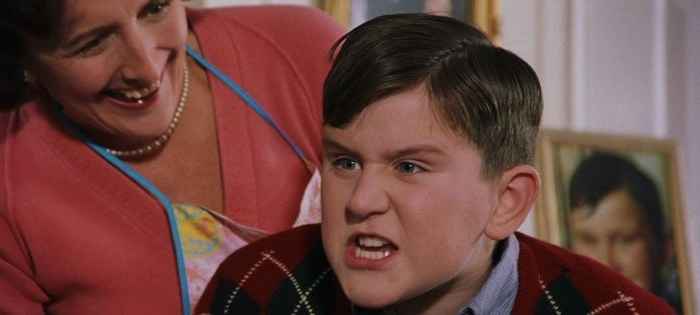
The first antagonist Harry remembers and interacts with regularly is his cousin Dudley Dursley. Dudley is the spoiled and cossetted only child of Uncle Vernon and Aunt Petunia, who have raised Harry reluctantly from babyhood. Vernon and Petunia favor Dudley to nearly comic extremes, treating Harry as a piece of furniture at best and a physical and verbal punching bag at worst. Yet it’s arguably Dudley who gives Harry the most trouble out of his so-called “family.” Dudley is Harry’s age; he doesn’t have the intellectual capacity or physical freedom of adults, which puts him on somewhat equal footing with his cousin. What makes Dudley an antagonist though, is his failure to recognize he has anything in common with Harry, whether that be age, family ties, or something else.
Dudley is a bully, physically and mentally. Though obese, he regularly asserts physical power over Harry. In Sorcerer’s Stone, it’s noted Dudley’s favorite game is “Harry Hunting.” He uses Harry as a punching bag, doing things like breaking Harry’s glasses and taking advantage of the other boy’s small, undernourished stature. Worse, Dudley uses his privileged position in the Dursley household to torment Harry as much as possible. Dudley knows his parents would never side with Harry over him, so he feels comfortable teasing his cousin and rubbing Harry’s disadvantages in his face. Every day, Harry must live with the fact that Dudley is given every opportunity and advantage the world has to offer, while Harry himself gets next to nothing.
Of course, compared to the other antagonists Harry will face, Dudley is pretty tame. However, J.K. Rowling included Dudley in Harry’s life for an important reason. Dudley is the first and easiest opposing force Harry copes with. He’s intimidating, but only to the youngest version of Harry. Dudley prepares Harry for obstacles he’ll face later. Over time, Harry loses any fear of Dudley and stands up to him often, even daring to taunt and challenge him. The more confident Harry grows, the more able he feels to take down tougher opponents.
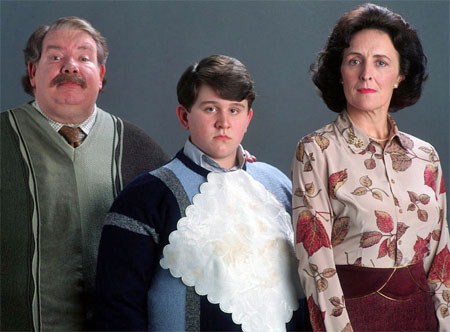
Harry’s first enemy is important for readers, too. Dudley reminds readers of the bullies we faced in our childhoods – the big boy on the playground who knocked people down and stole their lunch money, or the loud-mouthed girl who demeaned and insulted everyone who didn’t meet her standards. These bullies’ wounds hurt at the time, and some of them left lasting outer and inner scars. The Dudley Dursleys in our lives had power, but their power was limited because of their scope of control. Harry finds this out fairly quickly when he goes to Hogwarts. There, he meets Ron and Hermione, who become his best friends and always have his back. Just as importantly if not more so, at Hogwarts, Harry encounters adults he can trust for the first time. Dumbledore, McGonagall, Sirius, and others are firmly on his side; they can and do step in to put Vernon, Petunia, and Dudley in check when needed, and the effects of their “punishments” last. Like Harry, readers can defeat their Dudleys when they find support systems that work for them. Through Dudley, Sorcerer’s Stone and to a lesser degree, the other novels, encourage finding and maintaining that support.
Young Tom Riddle – Self-Doubt, Identity Formation
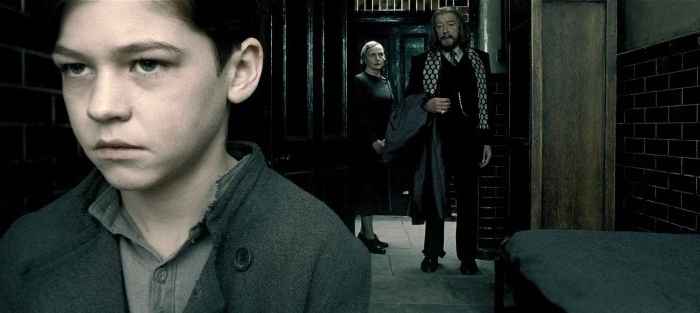
In Chamber of Secrets, Harry “levels up” to his next year at Hogwarts and his next antagonist. As the novel opens, Harry has a good grasp on magic expected for his age. He’s learned to navigate and accept the Wizarding World, even if some things in it remain mysterious. After a year of physical, mental, and emotional nourishment, he is ready to face and cope with the Dursleys’ abuse using new tools. Indeed, he must be especially creative with the Dursleys this year since it’s possible he won’t go back to Hogwarts at all. But Harry’s true test of mettle doesn’t begin until he does return to school, despite vehement objections from house elf Dobby and his own suppressed misgivings. Once Harry returns, he learns a few key things about this new threat. The new antagonist is unknown. He or she is after Harry in particular and thus, may be connected to Voldemort. Most importantly though, this antagonist is not content with simply eliminating Harry. He or she will use other students and teachers to get to Harry, effectively terrorizing the only true home he possesses.
It is in Chamber of Secrets that we see Harry’s true potential as a hero, and his ability to fight against a high-stakes enemy. He starts out with support from his best friends and other students, but loses most of it well before the final battle. The students and teachers of Hogwarts don’t know who opened the Chamber of Secrets or what monster lurks there, but they do know what it wants. The monster seeks to restore the Heir of Slytherin, a pure-blood fanatic who despises Muggles and has a strong connection to Voldemort. When the school discovers Harry, like the Heir, can speak Parseltongue, rumors fly. Harry is suddenly looked on with suspicion and fear. At one point, he’s accused of trying to harm fellow student Justin Finch-Fletchley. When the caretaker’s pet cat Mrs. Norris and a few Hogwarts students are petrified, Harry has no alibi. Ron and Hermione stick by him, but Ron is uncertain of his friend’s motives and true history. Even cool-headed and logical Hermione can’t deny her fears, since as a Muggle-born, she’s an Heir of Slytherin target. Whatever this monster is, whatever battle he must fight, Harry soon realizes he’ll largely face them alone.
Throughout Chamber of Secrets, Harry prepares to defeat a physical, tangible monster – a creature who can be studied, researched, and defeated through traditional means like magic or a sword. His final battle has elements of this; Hermione’s tireless research helps him uncover the identity and weaknesses of the basilisk, and Harry does use Dumbledore’s phoenix and the Sword of Gryffindor against it. Once in the basilisk’s lair though, Harry discovers this battle is far more mental than physical. The mysterious diary he’s been using to study his adversary belongs to Tom Riddle, a young man who attended Hogwarts fifty years prior. When the two face off, Tom explains he used magic to preserve his sixteen-year-old self inside the diary and return to Hogwarts later to finish his evil work. As an anagram of his name reveals, Tom Marvolo Riddle is an incarnation of Voldemort.
If Riddle’s identity stopped here, he’d remain a formidable opponent for our hero, but he has one more weapon at his disposal. That weapon is a gambit TV Tropes calls Not So Different. It’s what happens when a villain tries to convince a hero they have something in common and thus, the villain deserves sympathy or allegiance. Riddle takes full advantage of this, pointing out every similarity he and Harry share. Though Riddle is older and stronger, both boys are attractive. Both are reasonably good students, “street smart” if not “book smart,” and unusually courageous for their youth. Both are orphans who grew up in difficult Muggle circumstances – Harry with abusive relatives and Tom in an orphanage where, while not abused, he was denied individual attention and nurturing. Yet, Harry doesn’t falter until Riddle explores their deeper similarities.
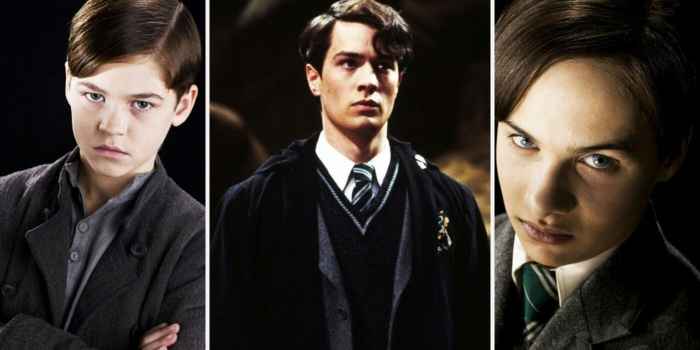
As one might expect, Tom Riddle is the Heir of Slytherin. In trying to convince Harry the two share similar goals, Riddle points out Harry’s own Slytherin tendencies, such as “potential for greatness” and “a thirst to prove [himself],” as the Sorting Hat once said. This, coupled with the painful isolation Harry has endured, causes him great emotional pain, which increases as he remembers he was nearly sorted into Slytherin. Throughout Chamber, Harry has wondered if the Sorting Hat made a mistake, and whether he could be as evil as Voldemort, deep down. These doubts take Harry’s focus from the ultimate goal and almost secure Riddle’s victory. Had Riddle succeeded, Harry would have lost his first true home and everything that made it such.
Riddle’s forte is upping Harry’s mental stakes. In Riddle, Harry faces the first person who makes him seriously doubt himself and question his motives. Riddle’s similarities to Harry make him what psychology calls a “shadow,” or a version of who Harry could be unless he chose to take a different path. Dumbledore points this out when he reassures Harry the Sorting Hat didn’t make a mistake. It placed Harry in Gryffindor because he pleaded not to be placed in Slytherin. “It is our choices that determine who we are more than our abilities,” Dumbledore says. Dumbledore acknowledges Harry’s abilities and perhaps his “potential for greatness,” but subtly points out that relying only on abilities is to give in to one’s “shadow.”
The struggle for identity is a common one among kids Harry’s age – it is perhaps the biggest one they’ll face as they head into their teens. Modern readers don’t have Hogwarts magic, but they do fight to separate themselves from what others think of them or have told them they are. They seek the independence required to make and live with their own choices, and wonder whether to define themselves by choices, abilities, or some combination. As Harry Potter readers undertake this quest, they will encounter self-doubt and frightening possibilities for their future. Older readers looking back on the series may recognize their younger selves in Harry, and Tom Riddle in their own inner critics or the people who doubted them. Chamber of Secrets indicates the struggle for self is one we must win if we are to continue growing, learning, and succeeding.
Sirius Black and the Dementors – Reconciling Past with Present
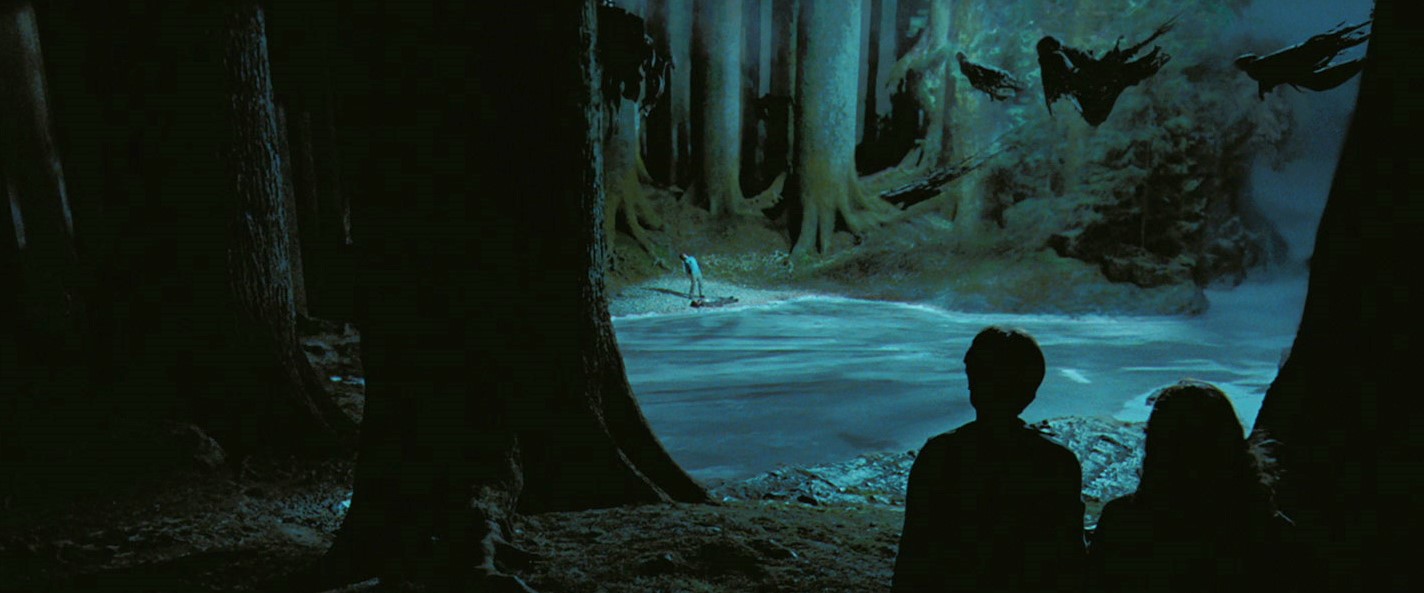
Harry Potter and the Prisoner of Azkaban takes us to Harry’s third year at Hogwarts. His confrontation with Tom Riddle and the basilisk has shown Harry he is a survivor. He’ll need that knowledge in his third year, when he finds out an escapee from the wizard prison of Azkaban is after him. Caring adults like Mr. and Mrs. Weasley try to shelter Harry, but he will have none of it. He eventually learns the prisoner of Azkaban is Sirius Black, and that most people find even his name intimidating. But with the audacity of a typical thirteen-year-old, Harry assumes he’s fairly safe. As long as he’s at Hogwarts and under Dumbledore’s protection, nothing can hurt him, at least not the way the Dursleys or Tom Riddle have tried to do.
Harry is proven wrong when a completely new and different antagonist arrives. On the journey to Hogwarts, a dementor, one of the Azkaban guards, enters the train. Its presence causes the air to chill and all hope and happiness to be sucked out of Harry and friends’ compartment. Ron and Hermione feel these effects, but Harry is the only one who faints from the encounter – right after hearing a woman screaming in his mind. Professor Remus Lupin, who was sleeping on the other side of the compartment, helps Harry come to and revives him with chocolate. Harry is left fearful and rattled. Whatever a dementor is or does, he never wants to encounter one again. If dementors have anything to do with Sirius Black, they must be doubly dangerous. It will take much more than chocolate for him to conquer this adversary and the terror it inspires.
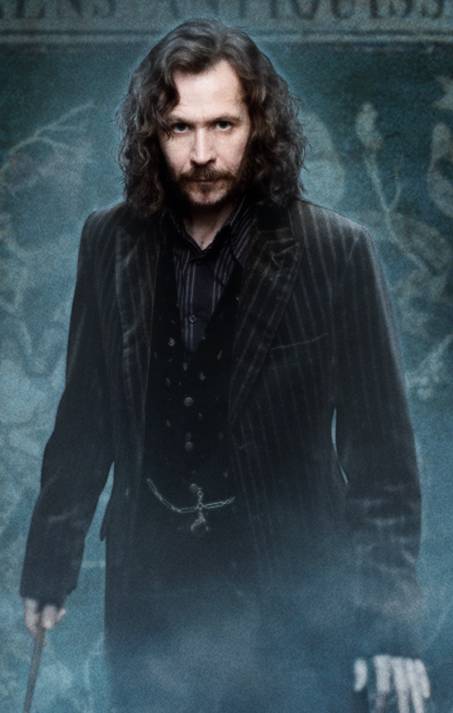
Harry spends much of Prisoner of Azkaban’s first half trying to work through that first dementor confrontation and figure out why the creature went after him in particular. Professor Lupin, who becomes his Defense Against the Dark Arts teacher, serves as Harry’s mentor in this area. Lupin explains dementors are so feared because they feed on hope. Their victims, such as Azkaban’s prisoners, are deprived of positive emotions and left to relive their worst memories, without a shred of hope that things will ever improve. It’s why so many of those prisoners die without any interference from the environment or Wizarding authorities. During Lupin’s first class, when everyone is asked to face and defeat their personal boggarts, Harry discovers his is a dementor. Lupin steps in to perform the ridikkulus charm and banish the boggart himself, but agrees to teach Harry how to defeat “fear of fear itself.” In acknowledging this fear, Harry moves one step closer to triumphing over what he fears Sirius Black may do to him.
Harry is not necessarily afraid of Sirius Black as a person, but what Black’s presence might bring up from Harry’s mind. As he works to master the patronus charm, Harry learns the screams he heard in his encounter with the dementor were his dead mother Lily’s. They were the screams of a terrified and dying mother sacrificing herself for her child. On a trip to Hogsmeade, Harry eavesdrops on McGonagall and some other professors. He discovers Black allegedly betrayed his parents to Voldemort during the first Wizarding War. Harry is infuriated, especially after learning Black is his godfather. How could such a trusted person betray his parents, he demands of his friends. Harry swears to kill Black himself and declares Black “better be ready” for him. He’s sincere, but discerning readers see terror and trepidation under his fury and bravado. Deep down, Harry fears if he does confront Black, he’ll be too overcome with memories and emotion to fight, much less win. Thus, Black will gain victory again and Harry will let his parents down.
More than any other Harry Potter novel, Prisoner of Azkaban deals with the antagonism of the mind. Tom Riddle embodied some of that, but here, much of the major conflict takes place in Harry’s own head. This begins with the dementor. Later, Sirius Black embodies hopelessness, as he threatens to bring Harry’s traumatic past to the forefront of his life. A traumatized person cannot protect themselves or others. He or she is emotionally vulnerable, oftentimes physically weak, and often overcome with a sense of being “stuck” in the trauma. Therefore, Sirius Black and all associated with him, including the dementors, have the potential to render Harry ineffective. Sirius doesn’t need to kill Harry; readers eventually learn that was never his objective in the first place. But if he can decimate his godson emotionally, Harry won’t be able to fulfill his destiny. He won’t be able to accept who he is because he’ll remain stuck in who he was – the helpless, vulnerable, and traumatized child of the parents who gave up everything for him and whose legacy he can’t carry on.
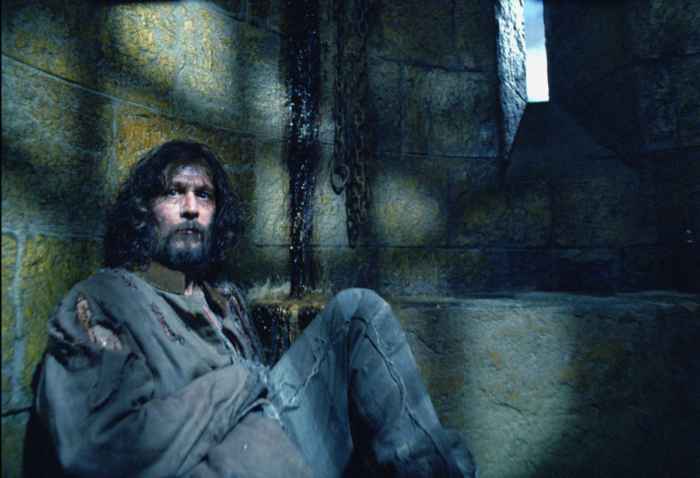
Harry eventually defeats Sirius – or what he represents – in an epic battle with Ron, Hermione, Lupin, and even despised professor Severus Snape at his side. The scene carries plenty of action, engaging young and adult readers alike. But the triumph doesn’t lie in Harry and friends’ escape from a werewolf, their use of time travel to save an innocent magical animal, or even their daring rescue of Sirius. The triumph occurs when Harry confronts Sirius with what he thinks he knows, demands the truth of what happened to his parents and why, and stands strong in the face of difficult truths. Harry’s real victory lies in the choice to believe in Sirius’ innocence, but moreover the choice to rise above trauma. As Harry’s mind and spirit grow stronger, he begins to reconcile his legacy, accept that others can have good intentions toward him, and deal more effectively with those whose intentions are malevolent.
It’s a rare reader who can say he or she has never felt depressed or hopeless, or as if all the memories they had were their worst ones. J.K. Rowling herself was suicidal shortly before beginning Harry’s series. Many readers have gone through one trauma or another, struggled with who to trust, or tried to reconcile who they were in the past with who they are and who they will be. Whether functional or dysfunctional, every reader has a family and has lived through family conflict, misunderstandings, and rifts that sometimes rip the fabric of family and friendships apart. Thus, every reader can identify with Harry Potter on some level as he confronts the truth of Sirius Black and his history. Prisoner of Azkaban encourages us not only to identify, but to take what we learn and become stronger, better people for it.
Triwizard Tournament – Ego and Mortality
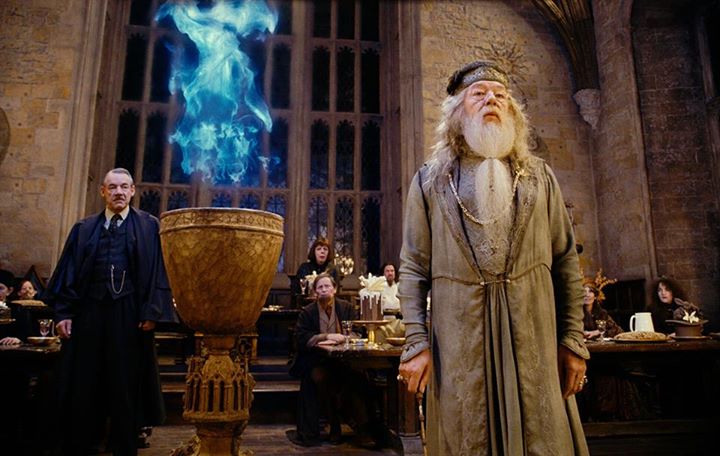
Harry Potter begins his fourth year at Hogwarts with a once-in-a-lifetime opportunity to attend the Quidditch World Cup with the Weasleys. The breath-stealing match between Ireland and Bulgaria foreshadows the challenges and unique antagonists Harry will face when he returns to school. After the match, someone appropriates a house elf’s wand to cast Voldemort’s Dark Mark over the Quidditch pitch. Harry and his compatriots don’t know for sure what this means, but Harry is too eager to get his fourth year started to give it much thought. Indeed, this will be an exciting year for the fourteen-year-old wizard, as Hogwarts is hosting two other wizarding schools in the Triwizard Tournament. Harry is too young to participate, but his name somehow ends up in the Goblet of Fire and is drawn in the selection. After much controversy, Dumbledore agrees to let Harry represent Hogwarts. However, the stakes are raised when Harry learns that once again, his life might be in jeopardy.
By now, Harry is used to others seeking his blood, but this time, his unseen enemy has an entire tournament on their side. The Triwizard Tournament is fraught with life-threatening obstacles, so if Harry’s enemy chose, he or she could use one of those and claim Harry’s death was accidental. Harry is prepared for this, doing his best to research his tests, find opponents’ weaknesses, and stay alive long enough to win the tournament. As with Sorcerer’s Stone, he falls back on the strengths of his support system, like Hagrid’s gift with magical creatures and Hermione’s dedication to research and knowledge. Using these, he studies how to best the Hungarian Horntail. He finds the secret to calming malevolent mermaids. Though Harry’s third test, a maze, is a surprise, he’s able to use the brainpower and savvy he’s built up to navigate it with reasonable confidence. Yet along with Harry, readers soon learn the physicality of the tournament isn’t Harry’s biggest obstacle.
As Goblet of Fire progresses, readers see Harry struggles with his ego. Some of this comes from victimization – not everyone is thrilled he’s been chosen as champion, and are vocal about that. Yet Harry is unwilling to remain a victim this time. He becomes angry and determined to “show them,” so to speak. At times, this leads to pride and the tendency to show off, not listen to wiser people, or neglect his friends. Facing his weaknesses forces Harry to admit that he may be the Boy Who Lived, but he’s not the center of the universe. There is nothing wrong with his desire to win the tournament, become physically powerful, or become champion for his entire school. If anything, that last desire is a bit selfless since everything and everyone in Hogwarts is so dear to Harry. Still, Harry’s ego, teenage angst, and natural adolescent self-absorption trip him up at times.
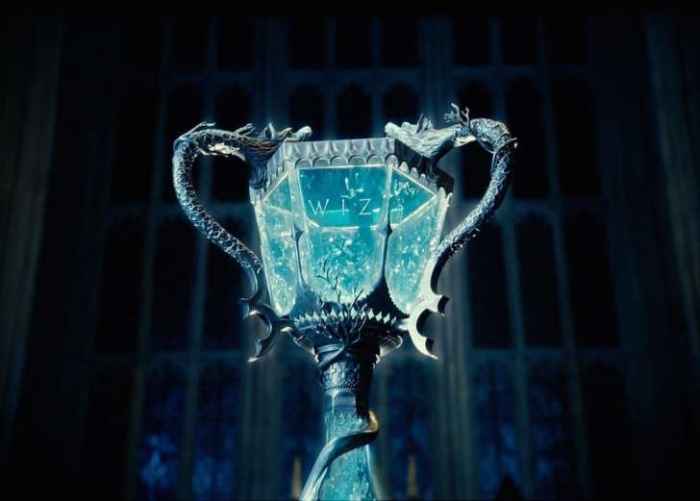 If ego and physical challenges were Harry’s only problems in Goblet of Fire, we could probably skip it and move straight to the intensity of Order of the Phoenix. However, the Triwizard Tournament lends a unique element to Harry’s struggles and the adversaries he faces in Rowling’s fourth installment. Along with ego, Harry faces his own mortality, sooner than most teenagers will and arguably too soon. Again, the intense nature of the tournament’s competitions are partially responsible for this. Every witch or wizard entering the tournament knows while every safety measure will be taken, death is a possibility. To a courageous boy like Harry though, the challenges he faces are thrilling as well as scary. He gets the same adrenaline rush from them a Muggle kid might get from bungee jumping, skydiving, or performing a stunt for YouTube audiences. Mortality only becomes Harry’s enemy when it strikes at his heart rather than his ego, boldness, or body.
If ego and physical challenges were Harry’s only problems in Goblet of Fire, we could probably skip it and move straight to the intensity of Order of the Phoenix. However, the Triwizard Tournament lends a unique element to Harry’s struggles and the adversaries he faces in Rowling’s fourth installment. Along with ego, Harry faces his own mortality, sooner than most teenagers will and arguably too soon. Again, the intense nature of the tournament’s competitions are partially responsible for this. Every witch or wizard entering the tournament knows while every safety measure will be taken, death is a possibility. To a courageous boy like Harry though, the challenges he faces are thrilling as well as scary. He gets the same adrenaline rush from them a Muggle kid might get from bungee jumping, skydiving, or performing a stunt for YouTube audiences. Mortality only becomes Harry’s enemy when it strikes at his heart rather than his ego, boldness, or body.
Harry knows mortality is a major issue in the Triwizard Tournament, but doesn’t face it until the third obstacle, the maze. During this contest, all four champions go in together. Their goal is to safely navigate the maze while defeating the frightening obstacles within. To be counted the winner, the aspiring champion must come out of the maze holding the Triwizard Cup, found at its center. If an obstacle proves too much for a champion, he or she loses automatically. The rules of the maze also state champions may not help each other, but Harry, fond of bending rules anyway, breaks this one when he realizes Cedric is in danger. Harry soundly thrashes his ego and defeats an inner antagonist when he helps Cedric escape Viiktor’s attempt at the unforgivable Cruciatus Curse. Mere moments later, he teams up with Cedric to best the maze’s giant spider. Yet it is not until both boys realize their trophy is a Portkey that Harry’s face-off against mortality begins. He and Cedric are thrown into the clutches of Death Eaters, as well as Voldemort, who has returned despite all reports that he was dead for good.
Voldemort and the Death Eaters dispatch Cedric in short order, shocking Harry and readers with the series’ first death of a major character. Cedric’s death is painful and traumatic, and partly because of its effect on him, Harry is almost killed as well. He ultimately wins against Voldemort, but must carry the memory of Cedric’s death the rest of his life. Harry doesn’t feel directly responsible for Cedric’s death, though he does speculate on his part in it and how he is going to cope with its implications. He spends most of the book’s end absorbing the fact that Voldemort has returned, will be stronger this time, and will defeat the good witches and wizards of the Wizarding World unless everyone sticks together. Harry soon realizes the Triwizard Tournament, which focuses on promoting unity and understanding, brought him to this point in his physical and mental journeys.
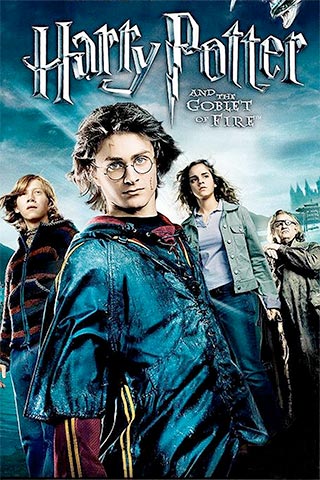
Whether they have seen someone die as Harry did, or faced death’s reality through secondhand experience, target audience readers are old enough to know death exists, is permanent, and has severe, lasting effects on those it touches. They, like Harry, have reached a point in their lives where sheltering has given way to being trusted with unpleasant realities. Among these are not only the reality of mortality, but the reality that our inner selves have deep flaws. Even those we love and trust, such as parents and teachers, can make huge mistakes. Book four marks a turning point for Harry and his young friends. After the death of Cedric and return of Voldemort, innocence can no longer shelter them. They may also make new peace with their own mortality through Harry and Cedric’s last adventure, which may enable them to prepare new generation for the realities it will face.
Umbridge – Cynicism and Disintegration of Trust
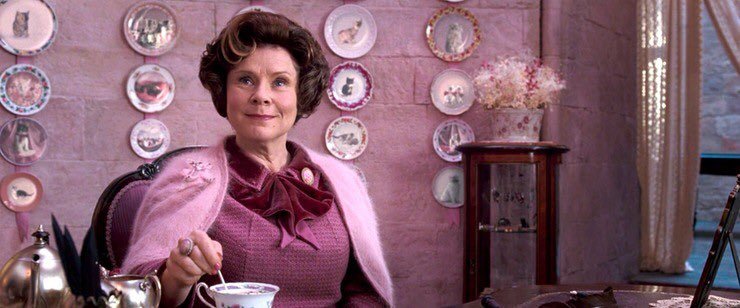
Harry Potter and the Order of the Phoenix finds Harry beginning his fifth year at Hogwarts. Harry faces intense pressure this year, as he will take his Ordinary Wizarding Level (OWL) exams, and try to answer the question of what comes after Hogwarts. That would be enough conflict for any ordinary teenager, but Harry has other obstacles to contend with. Except Dumbledore, no one believes him when he claims Voldemort is back, because no one else took the Portkey and ended up in the Death Eaters’ lair. The only one who did, Cedric Diggory, is deceased. As for Dumbledore, he seems too interested in protecting Harry from reality to actually help him process what has happened. Harry’s frustration boils over when he tries to save his cousin Dudley from a rogue dementor and faces expulsion for his efforts.
Harry’s expulsion hearing introduces readers to perhaps the most hated villain of the series, Ms. Delores Umbridge. This witch’s name inspires disdain – “Delores” is Spanish for “pain” or “sorrows,” and “Umbridge” is a riff on “umbrage,” a word meaning “to take offense,” or “to be annoyed or piqued.” Fittingly, Umbridge is the biggest advocate for Harry’s expulsion, despite the mitigating circumstances in his favor. Harry is only cleared of charges when Dumbledore defends him, but Dumbledore disappears after the hearing. Meanwhile, Hogwarts’ Defense Against the Dark Arts teaching position is vacant for the fifth time, and Delores Umbridge steps up to fill it. Harry and readers hope that with Dumbledore still at the helm, this annoying and suspicious woman will be kept in check, but those hopes are dashed within a few chapters.
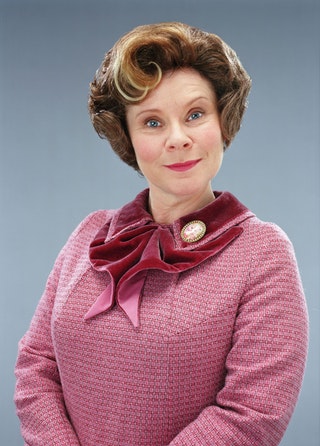 At first, Umbridge looks as innocent and sweet as her signature color, bubblegum pink. She often behaves like a kindergarten teacher, speaking to her students as if they were five or six and reprimanding them for imagined disruptions and infractions. Additionally, Umbridge expects Harry and friends to pass Defense Against the Dark Arts without any practical experience. Her classes consist of students silently reading chapters from a dry textbook, and giving no input other than what she expects them to regurgitate. If anyone breaks this routine, he or she pays for it. For instance, when Hermione asks an appropriate and practical question, Umbridge shuts her down. Later, Harry challenges Umbridge’s teaching methods in light of Voldemort’s return. Umbridge calls him a liar in front of the class, castigates him, and warns him never to bring up Voldemort again.
At first, Umbridge looks as innocent and sweet as her signature color, bubblegum pink. She often behaves like a kindergarten teacher, speaking to her students as if they were five or six and reprimanding them for imagined disruptions and infractions. Additionally, Umbridge expects Harry and friends to pass Defense Against the Dark Arts without any practical experience. Her classes consist of students silently reading chapters from a dry textbook, and giving no input other than what she expects them to regurgitate. If anyone breaks this routine, he or she pays for it. For instance, when Hermione asks an appropriate and practical question, Umbridge shuts her down. Later, Harry challenges Umbridge’s teaching methods in light of Voldemort’s return. Umbridge calls him a liar in front of the class, castigates him, and warns him never to bring up Voldemort again.
If Delores Umbridge’s antagonistic behavior stopped here, she would be bad enough. Like Severus Snape, she would be seen as an overly stern and self-important teacher, the kind who bullies students out of insecurity and a desire for control. Umbridge possesses these traits, but she doesn’t stop at verbal bullying. Her lust for power extends beyond the need to control the classroom. Delores Umbridge works for the Ministry of Magic, and thus has direct connections to one of the most powerful agencies in the Wizarding World. She wants to expand those connections to become head of Hogwarts. She figures – and rightly so – that if she can control the Wizarding World’s students, she can gain a major foothold with adults. To that end, Umbridge quickly progresses from classroom bullying to psychological warfare.
During his first detention with Umbridge, Harry is forced to write “I must not tell lies” over and over again – with an enchanted quill that carves the words into his skin with his own blood. Harry tries to stay stoic, but J.K. Rowling indicates he’s in great pain during the ordeal. It is implied Umbridge uses other grueling physical and psychological punishments on students who won’t comply with the way she operates. She regularly tries to convince students they “deserve to be punished” for questioning the system. She’s also said to use Veritaserum, a potion that forces the consumer to tell the whole truth, no matter how incriminating it might be, on at least one student. Slowly but methodically, Umbridge emotionally cripples some Hogwarts students. Others become determined to shut up, keep their heads down, and ignore what they know is right. Umbridge also recruits several students, mostly from Slytherin House, to serve as her Inquisitor Squad. The Squad is rewarded for informing on any student or teacher who doesn’t conform to Umbridge’s agenda.
With the Inquisitor Squad and the promise of draconian detentions terrorizing students, Umbridge turns her attention to Hogwarts’ other teachers – again, setting the groundwork for defeating adult targets. She has a few favorite targets. Hagrid is nearly fired after one of her surprise “class inspections,” and she actually fires Trelawney in front of an entire group of students and professors. However, it’s soon clear no one is safe from this woman. Some of the professors try to fight back. For instance, McGonagall stands up for Trelawney and lets Umbridge know exactly what she thinks of the new regime. Yet even the formidable Minerva McGonagall can’t stop what Umbridge does with Ministry approval. Dumbledore must eventually leave Hogwarts under accusations of mental instability, and Umbridge installs herself as Headmistress. Once in that position, she increases the power she already held as Hogwarts’ “Grand High Inquisitor.” This increase includes making reams of unjust “proclamations” banning everything from Quidditch to club meetings, and enforcing stringent, age-inappropriate behavior codes.
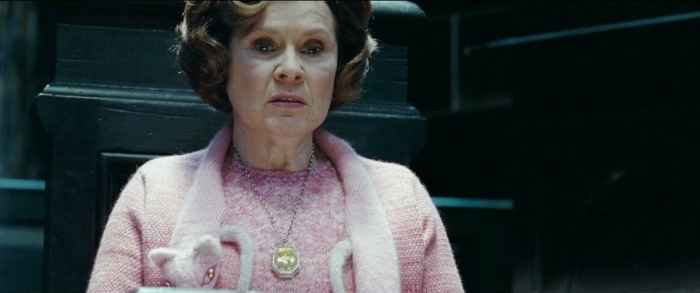
When Umbridge becomes Headmistress, her weaknesses are exposed. Delores Umbridge is a chronically cynical, fearful woman. She doesn’t trust the students and teachers of Hogwarts, with whom she is supposed to work as a team member. She also refuses to let others think for themselves, out of fear their ideas will upset her mental picture of what is good, right, and orderly. She doesn’t work for Voldemort, but is arguably a more dangerous villain, because she takes people and institutions down from the inside out.
Umbridge turns students against each other. She strips authority from anyone who intimidates her and completely rejects any idea that would leave her vulnerable, such as the idea Voldemort has returned. Every move she makes, from the smallest insinuation to the most sweeping proclamation, spreads cynicism’s poison through Hogwarts. Worse, her actions cause disintegration of trust. Under her, Harry learns he can no longer trust everyone in his beloved school environment as he used to. Furthermore, his fellow students no longer trust each other or themselves. Some of them, including Harry himself, undergo gaslighting when Umbridge tells them they deserve punishment. Umbridge employs extremely adult, complex, and underhanded tactics, and Harry soon realizes he must fight on her turf to defeat her.
In Order of the Phoenix, Harry gives two mature responses to Umbridge. First, he expands his circle of allies to include anyone who will stand with him, no matter how close they are, how well they can stand up to Umbridge on their own, or how different they are from him. For example, Harry finds an “odd” Ravenclaw student named Luna Lovegood is one of his strongest supporters. Secondly, Harry eventually turns to the older and more experienced adults in the Order of the Phoenix for guidance and assistance. Though anger and confusion made Harry rebel against these people at first, he soon understands Umbridge, and by extension Voldemort, will not fall unless everyone pushes together. Harry must sometimes force the Order to accept him and the other Dumbledore’s Army students as equal fighters, and sometimes, his plans backfire or end in disaster. But when Harry decides to rebuild trust for himself by trusting others, Voldemort is defeated, if only for the time being. More importantly, Umbridge is defeated. In that, Harry and his allies take down a version of Voldemort. They dismantle the way he works, and learn how difficult it may be to face him again, physically and mentally, one on one. This doesn’t solve everything. It doesn’t bring back Sirius, who dies protecting Harry, or restore the happiness our protagonists knew before. But this latest battle and antagonist gird Harry’s heart with renewed faith in himself and the people who love him.
Snape and Death Eaters – Hidden Agendas and Allies
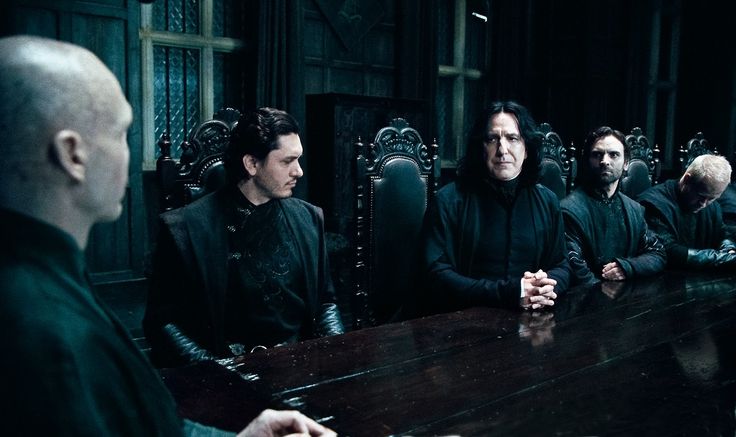
Harry Potter and the Half-Blood Prince chronicles Harry Potter’s sixth and penultimate year at Hogwarts. He has passed his OWLs, set a course to become an Auror (Dark wizard catcher), and is almost ready to enjoy the full rights and privileges of magic. More importantly, he has faced and won against five increasingly difficult and frightening antagonists. Yet a couple pieces of Harry’s puzzle remain, as Voldemort edges ever closer to making a final appearance in his world. These last pieces are not readily seen, nor are the antagonists behind them as obvious as before. They will push Harry to his limits, taking readers’ limits with them.
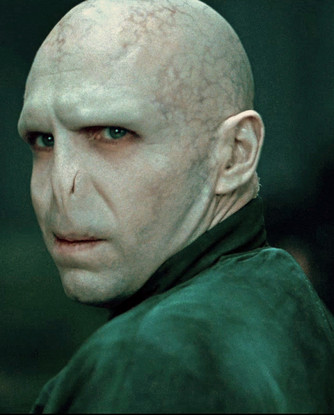
Now that the Wizarding World has accepted Voldemort is back, they must contend with his army of supporters, the Death Eaters. Throughout Half-Blood Prince, this army makes advances toward Hogwarts and the central showdown, by wreaking havoc in the Wizarding World. Many of Harry’s classmates lose loved ones; Hufflepuff Hannah Abbott is pulled out of Herbology on a perfectly normal morning and told her mother is dead. Susan Bones loses her Aunt Amelia. Meanwhile, the students whose families are left intact struggle with what the Death Eaters are doing now and the trauma they’ve caused in the past. For instance, Harry will never get over the death of Cedric Diggory, and the death of Sirius Black stripped him of his only loving family member. However, under the obvious external conflict, a high-stakes internal one throbs. The central question is, who is a Death Eater and hiding it? Who has hidden agendas? In this time when so much trust has been broken, who should Harry and friends trust?
Instead of bringing forth a new enemy, Rowling takes us back to one Harry has had since day one at Hogwarts. In Half-Blood Prince, Draco Malfoy finally gets his chance to shine as an antagonist. Thus far, he’s mostly been a childhood bully – a magical version of Dudley Dursley, if you will. His taste for the Dark Arts and zeal for blood purity have made him an adversary readers love to hate, but he’s older now. Like Harry, Draco has more magic and better connections at his disposal. Thus, the thought that he’s an undercover Death Eater raises the stakes for Harry and everyone at Hogwarts. A seventeen-year-old racist Slytherin, and one of the most wealthy and well-connected ones, could conceivably recruit as many fellow Death Eaters as he wanted. Harry and his friends know an entire house could turn against their school. Failing that, the adults on Voldemort’s side could make Hogwarts a living hell. What scares Harry most though, is one of those adults is right under Hogwarts’ roof.
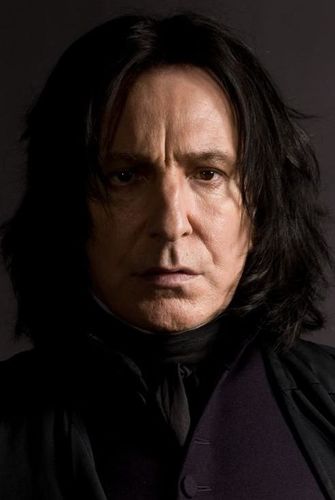
Like Draco Malfoy, Severus Snape returns to the forefront in Half-Blood Prince. And like Draco, he’s waited until book six to show his true cards, at least some of them. Alan Rickman explains this in an interview on the set of Half-Blood Prince. “There’s always been an agenda,” he said. “You just never knew what that agenda was going to turn out to be.” Indeed, Snape’s agenda has always been one of the only things readers knew about him. “He lives in very tight confines,” Alan Rickman said. “He’s intensely focused.” Now, in Half-Blood Prince, it’s up to Harry to find out what the epicenter of that focus is. Snape looks, speaks, and acts like an undercover Death Eater, but is he? Is Dumbledore right to keep insisting Harry trust Snape, who thus far hasn’t given Harry any reason to do so? Harry must be careful in his conclusions, because the fate of Hogwarts could rest with them. If Snape is a Death Eater, Harry could play a part in bringing him down and saving the school he loves. But if he’s wrong and Snape is one of the “good guys,” misjudging this teacher could put Harry and Hogwarts in greater danger.
Searching for answers, Harry turns to the one adult he’s always felt was trustworthy – Dumbledore. Indeed, Dumbledore remains Harry’s mentor, but in this installment, he takes his protege’s journey to the next level. Harry soon learns he must find and destroy Voldemort’s remaining Horcruxes, or objects into which he placed pieces of his soul so he could remain immortal. J.K. Rowling brilliantly marries the quest for the external and internal, because it’s hinted that once Harry finds and destroys all the Horcruxes, he’ll have a better understanding of who is on his side and what they need from him. Dealing with Horcruxes will give Harry the final strength he needs to battle one more time as the Boy Who Lived.
The quest for the external and internal is present throughout Half-Blood Prince, right up until the climax. There, Harry and Dumbledore end up in a cave near a lake filled with Inferi, or dead bodies Voldemort bewitches to do his bidding. Inferi are a physical enemy Harry must defeat, but they are also the embodiment of his worst fear – emotional death. Emotionally, death means losing connections to home, the people he loves, and what feels familiar. The specter of emotional death has haunted Harry since he was a baby. The battle of the cave therefore tests his ability to stand against his longtime foe, whether in physical or spiritual form.
In Half-Blood Prince, readers see Harry nearly lose this battle. During the Horcrux search and ensuing cave confrontation, Harry must watch Dumbledore drink a potion that causes him horrible pain, almost on a level with the Cruciatus Curse. Later, when the two get back to Hogwarts, Death Eaters break into the school. At first, this vindicates Harry, as he sees Draco Malfoy fighting alongside the Death Eaters and is able to prove his earlier theory. But Harry becomes confused and disillusioned when Draco switches sides and Snape tries to protect him. Why would a teacher who claims not to work for Voldemort, even a bitter and bullying one like Snape, protect a student like Draco just because he claimed to switch sides at the last minute? Worse, Harry experiences another emotional death when Dumbledore is struck down in battle. Snape casts the Killing Curse (Avada Kedavara) on Dumbledore, leaving Harry in a dark place. On the one hand, he takes some security from knowing he was right about Snape, who now embodies the worst kind of evil. On the other hand, he has lost his mentor, the last adult he had a close relationship with. Emotional and spiritual death threaten to cripple him again, especially after Snape defeats him in a vengeful duel.
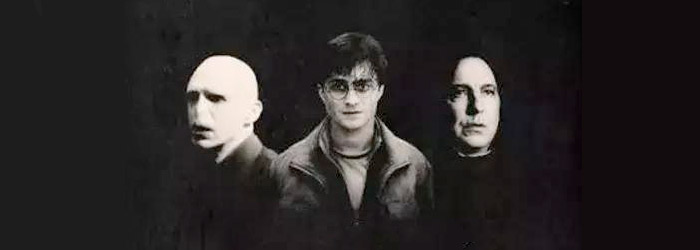
As children, we fear the physical, including physical obstacles or death, far more than the emotional or spiritual. Our emotions and ability to think abstractly are underdeveloped, and we do not see the nuances in people. People are either completely good or completely bad, and never the two shall meet. Like Harry though, we find and embrace those nuances as we mature. We also learn to recognize and fear emotional death more than physical, because living in dark places is often harder than dying. Sometimes we lose the people and connections we depended on and loved. Sometimes we must duel with the consequences, internally if not externally. Harry’s confrontation with Snape symbolizes all our inner duels, some of which we will lose. In the end though, we must be strong enough to get up and keep fighting, until we can reach a place where the fear of emotional death is defeated in us.
Deathly Hallows – The Last Enemy, Death
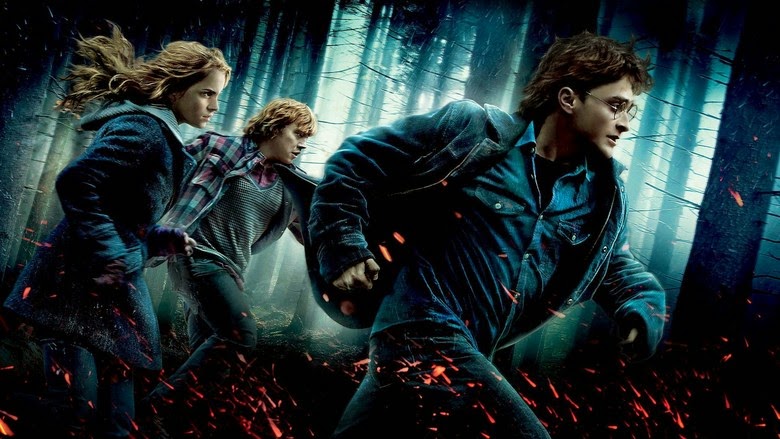
J.K. Rowling has one more book and a few more tricks up her sleeve. These come to light in Harry Potter and the Deathly Hallows, where Harry finally faces Voldemort for the last time. He’s seventeen now and should be a “senior” at Hogwarts, but cannot return to school for his last year.Several decoys fail to protect Harry, and he loses Hedwig, the last symbolic vestige of his innocence. Hagrid too, is forced to leave him for his own and Hogwarts’ protection. Harry meets up with Ron and Hermione at Hogwarts, only for the three of them to learn their school is no longer home, or safe. The Death Eaters have taken over everything from Hogwarts itself to the Ministry of Magic. In consequence, Severus Snape is appointed headmaster, and furthers Voldemort’s terrible regime. The Sorting Hat is burned and all students are forced into Slytherin House. After former Muggle Studies professor Charity Burbridge is killed, the class becomes a hub of propaganda where students are taught that Muggles are basically filthy animals to be exterminated. Defense Against the Dark Arts becomes simply Dark Arts, where students are forced to learn to hex and curse each other and use Unforgivable Curses. Apparently on Snape’s orders, Alecto and Amycus Carrow are brought in to teach these new subjects. Unlike Snape, they are zealous Death Eaters who delight in torturing students on a level that makes Umbridge look tame. Harry, Ron and Hermione must flee into the wilderness.
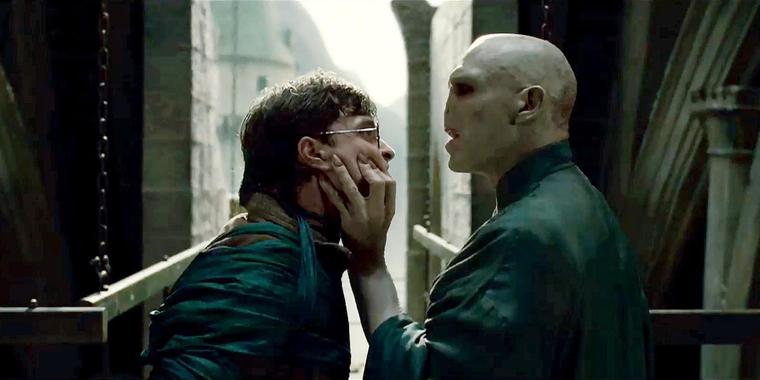
With his final safety net obliterated, Harry must use everything he has learned so far to prepare himself for battle. His friends go through similar journeys. Ron, for instance, finds one Horcrux in Slytherin’s locket, which corrupts his emotions and causes him to disappear for weeks. Meanwhile, Muggle-born Hermione faces the immense pain of wiping her parents’ memories. They no longer know they had a daughter, and she may never see them again. More than ever, the trio must depend solely on each other. Yet their friendship is threatened when misunderstandings nearly pull them apart. For instance, Ron believes Harry has betrayed him by being romantically involved with Hermione. Harry, in turn, is nearly crushed when he believes he has lost his best and first Hogwarts friend. Only when they work through this surface-level drama can our three heroes find empathy for each other and empathy for their world. Only then will they be prepared to save it.
Ron and Hermione return to Hogwarts, but Harry must stay in hiding, as he is a wanted man. Snape decrees any Hogwarts student found to be aiding or abetting Harry will face severe punishment. Ron, Hermione and several other members of Dumbledore’s Army are forced to mount another underground resistance in the Room of Requirement. But because Harry is the one Voldemort really wants, he will not accept defeat at the hands of anyone else. This hearkens toward another adult message. That is, the battle against Voldemort is ultimately Harry’s alone. As adults, our support systems may always be there, but there are some enemies we must face one on one, because their defeat won’t impact anyone else as much.
Harry finally bursts into Hogwarts one night, in the middle of Snape’s speech declaring Harry Potter is dead. He confronts Snape about killing Dumbledore – “How dare you stand where he stood! Tell them where you were that night! Tell them!” This inspires the other students to rally around Harry, and sets off an epic duel between Snape and McGonagall. McGonagall triumphs, sending Snape hurtling through a plate glass window, but the battle has only begun. With Dumbledore’s Army, the Order of the Phoenix, and other pro-Potter characters scattering in different directions, McGonagall casts a number of spells to protect the school. She also gives her students explicit permission to blow it up, because a destroyed Hogwarts is better than one with Voldemort at the helm.
Some of Rowling’s darkest and most intense battle imagery ensues. Harry and the other characters begin to lose dear friends, and readers lose them with him. Hedwig’s death and Hagrid’s departure were wrenchingly painful, but now it seems beloved characters are dropping like flies. Remus and Nymphadora Tonks Lupin are killed, mere months after their marriage and birth of subsequent baby Teddy, leaving another orphan of war just like Harry was. Readers around the world still mourn the death of Fred Weasley, George’s twin brother and partner in crime. McGonagall is consigned to the hospital wing on the brink of death after taking four stunning spells to the chest. Meanwhile, surviving students are either risking their lives, in hiding, or trying to help the first- and second-years get to safety. Slytherin House in particular faces a grave moral dilemma, as many students find friends and family members are, so to speak, fighting for the other team. Draco in particular finds himself in danger, marked for death after his mother Narcissa lies to Voldemort’s face about her son’s location. Even through all this, the focus remains on Harry and his final confrontations, internal and external.
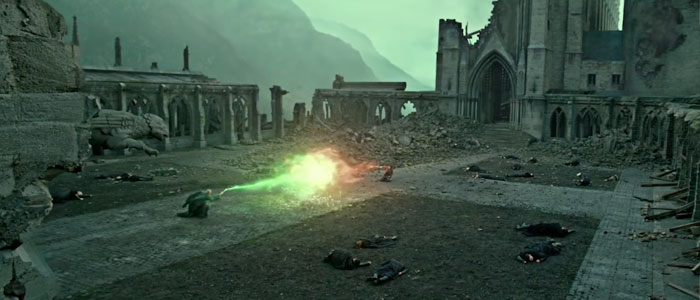
During the Battle of Hogwarts, Harry must put his prejudices to death. Readers learn that Draco Malfoy, his mother Narcissa and some others have defected from the Death Eaters, but Harry is not yet ready to accept them as repentant. He is certainly not ready to accept this from Snape, who he now considers destroyer of everyone and everything he loved. This interpretation seems to fit Snape’s character; we have seen him malign and abuse Harry for six books. Many times, Snape even seems to aid in Voldemort’s attempts to kill Harry. Yet, Snape allows himself to be expelled from Hogwarts and fatally bitten by Nagini, apparently for the sake of protecting Harry. Harry must face another adult question – what do I do when people aren’t who they say they are? Is there a place of safety for anyone?
Harry gets some final answers when Snape allows Harry to see his memories. In this, presented as The Prince’s Tale, we learn Snape’s tragic history. Notably, we learn that he, like Harry, was an abused and neglected child, a half-blood whose salvation lay in Hogwarts. Lily Evans, who would eventually become Harry’s mother, was Severus Snape’s only true friend, whom he grew to love. Yet Snape lost Lily to James Potter, whose friend Sirius Black actually tried to have Snape murdered when they were all fifteen. In his pain and grief, Snape became a Death Eater, but defected after Voldemort killed Lily in the first Wizarding War. Snape’s only recourse at that point was to become a double agent under deep cover, working for Dumbledore and the Order. He dedicates himself to protecting Harry out of devotion and the desire to prove himself on the right side. Though being warm obvious about it would blow his cover, Snape is tireless in this, mentoring Harry on the sly in his acerbic way.
Harry’s new knowledge gives him empathy for Snape; later, he will name a son after him and call Snape “the bravest man I’ve ever known.” It is not until Harry learns the truth about Dumbledore’s death, however, that he can fully lay down his former thoughts and prepare to face Voldemort. It turns out Snape killed Dumbledore on the latter’s orders, as a ploy to defeat Voldemort. This causes a major rift between Dumbledore and Snape, who rightly accuses the former headmaster of “raising [Harry] like a pig for slaughter.” This knowledge catapults Harry into his final adult realization. That is, the people we love and hate are morally grey; Snape was not inherently evil and Dumbledore was not a saint. As Dumbledore told Harry long ago, “It is our choices who shape who we are.” Seeing the choices his two mentors – one obvious and one highly unlikely – have made, prepares Harry to make his own final choice.
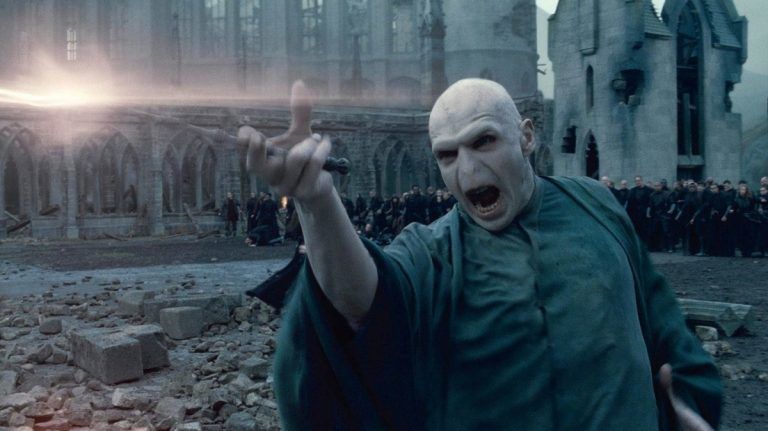
Harry faces Voldemort for the final time when Hogwarts is apparently deserted and nothing more than a shell of its former self. His friends and mentors are gone, and his head is spinning with knowledge regarding the lies he always believed and what was true all along. The best way to put this knowledge to use is to defeat his last enemy, the harbinger of physical and emotional death who has taken so much from him. When Voldemort taunts, “The Boy Who Lived, come to die,” Harry challenges him to finish what he started. Our hero and villain fire mortal spells at each other, wands locked in a deadly stalemate, until Harry finally wrests control of the Elder Wand, the most powerful wand in the world, from Voldemort. Rowling reiterates Harry is able to do this through love – his mother’s sacrificial love yes, but also the love of people like Ron, Hermione, Dumbledore and even Snape in his own way. Ultimately though, it is Harry’s love for Hogwarts, his home, and his friends that defeats his final enemy. It hearkens back to the Biblical themes, “Greater love has no man…than he lay down his life for his friends,” and “The last enemy to be destroyed is death.”
Children and adults alike may never fully destroy emotional and physical death as Harry did. Death will always be with him, although the epilogue to the series states “All was well” and gives surviving characters happy endings. In writing this last book, however, Rowling does not encourage her readers to defeat death on their own. She instead points to the one thing we all need to defeat any enemy – love. Whether we get that from inside ourselves or from a God like Jesus Christ, using it allows us to stand triumphant.
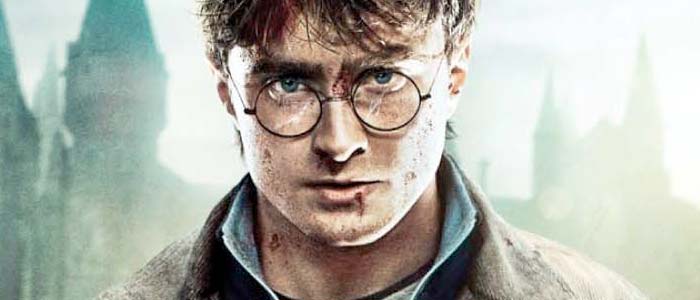
In Harry Potter, Joanne K. Rowling created one of the most complex storylines and series ever written, and some of the most complex characters. The most intriguing of these were her villains and antagonists. Each person or group of people represents an enemy Harry Potter must face and defeat on his epic journey to take down Voldemort, the harbinger of death who stole everything from him as a baby. As Harry faces increasingly high stakes and complex adversaries, he grows and matures. More importantly, readers have the opportunity to grow, learn and mature with him.
What do you think? Leave a comment.











I just can’t resist to point out that Lucius Malfoy is the most realistic antagonist in western societies. He only cares about making sure he makes the best of every possible situation. Sure, he is bigoted and elitist and he’d prefer to be served by undermensch but he won’t jeopardize his position to achieve that. He reminds me of industrial corporate leaders before and during WWII. They got in, supported Hitler, made a lot of money and established their position as leaders in the market and then went out relatively unscathed, continuing to control the western bloc via Fudge-like politicians. Only in our case, there was never a Hitler comeback to unmask them so they continue to reign supreme. That is in my opinion the most terrifying kind of evil, the one that we convince ourselves that we need in order to keep our society running.
@bable: Great point. If you ask me, the Malfoys could have an article all to themselves (and wouldn’t Lucius just love that)? 😉
Nice indepth piece on the villains. Voldemort may be the primary villain in the story, but I’d argue that Umbridge is the true fascist.
I couldn’t agree with you more, I feel that in his own twisted and power hungry way, Voldemort is just doing things for himself. Umbridge, on the other hand, is purely evil and disgusting. Her personality is revolting, and everything she does is to be cruel and in control. She never cared who she worked under or what she stood for as long as she was on top. At least Voldemort has a code (despite how terrible his code is, he sticks by it).
Tom Riddle was just a sad orphan who circumstances and extensive talents ruined everything he could have been. Harkening some Dumbledore wisdom: it is our choices who make us who we are, far more than our abilities & Do not pity the dead, pity the living, and most of all, pity those who live without love (all paraphrased, obviously). It’s the life without love that turned him into Voldemort.
@Johana: And a life without love is no life at all. (That’s from Ever After, by the way).
Umbridge (and Snape) were the teachers that haunted us in our childhood and teens.
Yeppers. They don’t have to be teachers, either. I had a couple of colleagues once who were Umbridge without all the pink.
Draco grew on me. He was at most a spoiled brat, but when working for Voldemort became a reality for him, you could tell that it wasn’t what he believed in. He was mortified by the fact that he could have killed Katie, and he just couldn’t pull the trigger when facing Dumbledore, even though the fate of his entire family depended on it. Plus, he changed after the wars.
@Jose: I totally get that. Snape has grown on me in much the same way. I cannot and will not excuse his actions toward his students, and don’t get me started on what he did to Lupin (because Lupin is one of my precious fictional babies). But underneath it all, Snape was primarily a broken, desperate soul. I think the reason people insist on despising him is, they don’t want to admit we could all be in his position and choose wrong. Same for Draco and the Malfoys, actually.
Totally agree. I share the same feelings towards both Malfoys. Narcissa was also far from being a villain. She was arrogant and discriminating and unpleasant, but she was never an official death eater, she participated in nothing, and everything she’d ever done was for her family. In book 6 when the trio saw Draco trying on a new cloak in a shop, her opening statement to Harry was “if you ever hurt my son again”. Even though she despised “mudbloods”, she cared very little about all the Voldemort business, and then there’s the famous “is Draco alive”. She barely cared about all the war and politics, she was just a very devoted mother and wife to a family that most readers despise.
The most evil character in Harry Potter is Bellatrix Lestrange. She was really a cruel lady who killed her own brother Sirius Black (Harry’s godfather). I really felt bad for Harry at the battle at the Ministry of Magic in the Part 5 (Harry Potter and the order of the Phoenix)
@Karren: As did I. Bellatrix deserved everything she got (I LOVE Molly’s moment just before killing her in the film). The only reason I didn’t spend time with her is she doesn’t get nearly as much page time as Umbridge, who gives us a lot to despise.
I’ll never forgive her for killing Harry’s only family member, Godfather, Sirius Black. He devoted his life just to protect his friend’s son. Her voice still echoes in my mind, “I killed Sirius Black” along with an evil laugh. How evil is she when she can kill her own cousin and rejoice the occasion.
So true. The destructions caused by her in the whole series are much much more than the destructions caused by Lord Voldemort.
I felt that my happiness reached the top when Molly Weasley destroyed her in the last part of the series.
I just want to point out here that Sirius was not her brother, but her cousin. Bellatrix only had two sisters – Narcissa (Malfoy), and Andromeda (Tonks). Sirius had one brother, Regulus. It is implied in the fifth book that Sirius never liked Bellatrix, nor Narcissa much, and only enjoyed spending time with Andromeda. So while it is still an awful, downright evil thing that Bellatrix did, I do not think it is the same as killing your brother, who you grew up with.
I was honestly surprised by her disclusion from this article. While Voldemort was the one to kill Harry’s parents, he had a self-motivated reason for that. He believed he had to kill Harry in order to be immortal, and James & Lily stood in the way of that. I’m certainly not justifying their killing, but I’m just pointing out that he had a personal stake in the matter, and he wouldn’t necessarily have killed them otherwise, (especially with James being pureblood). However, Bellatrix Lestrange, the executioner of Harry’s other pseudo-parent/godfather figure, Sirius Black, committed murder for her cruel enjoyment alone. It was during a battle that Sirius died, but it was also right when he was fighting alongside Harry. Bellatrix gained nothing personally from killing him, making her far more cruel than Voldemort. I would be open to the argument that it is more a issue of situation; that in Bellatrix’s place, Voldemort would also have simply slain his enemy in a battle (and in fact, I’m sure he did), but Bellatrix’s killing of Sirius is also more impactful on Harry- who knew him as an adult, and yet never really knew his parents before they died.
Brilliant insight into all the antagonists of Harry Potter.
Really great post! I love thinking about the villains, big and small. (And, I love Harry Potter, so you can never go wrong there!)
No, you cannot. I want to be J.K. Rowling when I grow up – as in, create the kind of memorable characters and worlds she does.
What a great blend of literary and film analysis. As a film graduate, I love reading and analyzing new aspects of films – and by further extension – the books they are birthed. Loved your analysis.
Great article! Very clearly written, logically organized, with a lot of insight. I even learned a useful expression I hadn’t run into before, “gaslighting”. The article is also very clean with only a few editing slips.
One thing I noted about the series is that for the first books at least I was always uncomfortable with the way the Dursleys are represented. (When I was little I was bullied by a boy who was much heavier than me–though in pictures he does not look fat at all–so I sympathized with little Harry.) They are like cutout stereotypes. Even the movies, which I saw after reading the books, do the same thing. It made me feel embarrassed for the sake of the human race.
But these are just quibbles. I have to give tons of credit to JK Rowling for making it in fiction writing today. I am So impressed by her!
A great discussion. I do love HP there is some really interesting applied theory discussions that can be had around this text. One of the things that makes children’s literature so interesting is that they are theoretically so complex. Thanks for sharing.
This. Is. AWESOME.
Draco is a difficult character to grasp, but there is so much more to him than the stuck-up, spoiled brat we saw at first. The first thing to understand is that nearly everything we’ve seen of Draco has been filtered through Harry’s eyes, which aren’t the clearest, even with the glasses. Draco reacts differently when Harry is around, and any commentary we have on Draco is from Harry, who isn’t the most objective party.
Personally, I like Barty Crouch Jr. because he is JUST a normal dude. With a lonely childhood who shows that normal dudes from „good“ upbringing can become completely fanatical and evil. I find him fascinating.
Don‘t like the films, mostly.
I would like to mention Lucius Malfoy. Let’s go over this guy, as many people generally don’t give this man the credit he deserves as a true antagonist even if he ultimately prioritises his family’s safety first. He’s not insane or wild, but he’s a man that’s not only evil but is also very intelligent, composed, resourceful and is socially very respected and connected, making him the most dangerous death eater in his own right as he can have you killed and get away with it even if a dozen eye witnesses swore it was him.
Voldemort is such a complex character. He cannot internalize a concept of right and wrong, and he refuses to accept any external limitations on his behavior. He never feels any conflict about his actions.
Interesting analysis of these characters. Voldemort isn’t capable of emotion so therefore it is more understandable that he can commit these crimes. In a way Voldemort is even pitiable.
It is ostensible that the need for conflict is reflected upon the article on, “Harry Potter.”
How conflict is integral to storytelling is discussed.
Without conflict there is no drama and without drama there is no entertainment.
All this analysed skillfully in the article.
well-done.
Voldemort is such an interesting character, whilst I hated him I also loved him at the same time. When you really look into his backstory you realize that he had a really difficult childhood and you can sympathise with him.
It’s absolutely heartbreaking that he’s unable to feel love after being conceived under the influence of a love potion.
This was analysed very well, it was really interesting.
Wow! What an amazing write-up. The way you broke down each villains effect on not only the story but Harry personally, and what they represent in regards to growing up and coming of age as a young adult is fantastic.
I’ve always though the villains in Harry Potter were fantastic, but this makes me see them in an entirely new light! Great read!
Umbridge is the true villain alright.
Characters who oppose antagonists in smaller ways give us flavor and are hella fun to read, write, and see get KILLED OFF HORRIBLY ahahahahahaha… *cough*
Vernon Dursley was a cruel, narrow minded narcissist. A control freak and a antagonist in every sense of the word.
Dolores Umbridge is the perfect combination of evil, ruthless tactics and tyrannical leadership under her sweet attitude. She doesn’t even meet the basic qualification of a teacher. She not only misbehaved with students but also with her fellow teachers. That moment when she fired Professor Trelawney was the most evil act Hogwarts have witnessed.
@Roni: Agreed. It’s tough to put your finger on, but there’s just something about that moment with Trelawney that feels so much more personal and evil than the actions of some other characters in the series. In fact, I think that’s what makes Umbridge so universally hated. Yes, Voldemort is a formidable villain. Yes, he’s basically the Wizarding World’s Hitler. But he’s an equal opportunity villain. Much of what he does is fairly impersonal; as long as you’re not a pureblood witch or wizard, you’re fair game. And even if you are, that won’t protect you (see Arthur Weasley). Umbridge, on the other hand, calculates who her victims will be. She knows where everybody’s button is, where to push, and how hard. Worse, she always has some excuse or defense, somebody protecting her. UGH.
I was very happy when Hermione and Harry tricked her and took her to the Forbidden Forest.
I thank centaurs for taking her away.
I hate Dolores… she was in a position of power and used it to make the wizarding world an even worst place at a time where Death Eaters were running rampant. She showed no special magical abilities but her keen sense of the law and how to bend it to her cruel will makes her the most vile, despicable character in the wizarding world.
@Murray: Yes, especially what you said about using her keen sense of the law to commit villainous acts. In my opinion, those are the worst types of villains – those who play by the rules, but only to exploit other people. Of course, other villains like Snape do that, too. But Umbridge makes Severus Snape look like a teddy bear.
Nice, thorough, and in-depth analysis. Love it!
I feel like the villains you selected for the article also represent an interesting juxtaposition against for Harry. They remind me of Batman’s Rogues Gallery, in that they represent shadow versions of Batman that have gone down a different path.
Dudley is a spoiled, only child, who sees himself as better than other around him. Could this possibly have been Harry’s fate if he was raised by his parents who were wealthy and famous?
Tom Riddle, a fellow orphan, gave into his pain and anger and chose a path of destruction. Harry could have just as easily gone down this same path, and arguably, meeting Tom Riddle in The Chamber of Secrets may have galvanized him onto the path of being a “hero”.
Umbridge was a paranoid control freak, lost in her twisted morals and isolated from her colleagues and community. Harry could have easily chosen to follow her example, as many times before he had pulled away from his friends during arguments. If he needed to be uncompromising in his beliefs he could have ended up like Umbridge. Like with Tom Riddle though, Harry distanced himself from the kind of mentality. He built a larger network of friends and allies and this community is what really helped him when he really needed it during the Battle of Hogwarts.
It extends to the other villains as well, these are just some examples that really stood out to me.
This is some of the most thought out Harry Potter analysis I’ve seen. It’s an interesting take on the antagonists of the series I enjoyed reading.
@maticusarts: I didn’t plan it, but you’re right. I agree, especially about Dudley. If I recall correctly, that was a reason Dumbledore cited for leaving Harry with the Dursleys in the first place. I don’t agree with it; in my mind, there is no excuse for leaving a child in an abusive situation for eleven years when it is within your power to do something about it. But had James and Lily lived (oh, don’t we all wish), I could see Harry growing up to have some of the same negative tendencies as James. I’m a supporter of Alternate Universe fanfictions and headcanons where instead of the Dursleys, Harry is taken into Hogwarts and raised by somebody like McGonagall – someone tough, but loving and fair. (Yes, Sirius Black would be the logical choice, and I support that as well. But I can also see him being too lenient with the kid).
The biggest antagonist in Harry Potter isn’t Voldemort, it’s Dumbledore.
Bear with me here. I can back up my argument.
Dumbledore is responsible for tens of millions of deaths (more than the number of people killed in the Holocaust) every year!
In contrast, the all-time total kill count of Voldemort and his Death Eaters is probably under 1000.
How can this be? The answer is simple.
According to JK Rowling, wizards can cure any Muggle ailments using magic. Due to the International Statute of Secrecy, however, they may not use their magic to help Muggles. The wizarding world could easily save millions of Muggles a year, yet they choose not to.
Grindelwald wanted to change this. He would have revealed the existence of wizards, and established a society where wizards rule over Muggles. While this would have had Muggles living as a slave race, it would have also meant that they had access to magical cures for Muggle diseases. It is better to be in a prison in England than to be a free man stranded alone in the middle of Antarctica.
Who was responsible for thwarting Grindelwald’s plan, and as such condemning hundreds of millions of muggles, over the years, to death? Why, none other than Albus Dumbledore, of course!
So forget Voldy and his shenanigans. Dumbledore’s misguided sense of justice has made him the greatest killer in human history, dwarfing Hitler, Stalin, and Mao.
@Savage: I don’t make a habit of comparing fictional people to real ones, but you raise some extremely valid points. The further I got into the series, the less I liked Dumbledore. He presents as this kind, wise mentor, but nine times out of ten, he’s out for himself. He uses Hogwarts and Harry as pawns so he can be the hero who gets much of the credit for Voldemort’s defeat. Snape was right – Dumbledore raised Harry like a pig for slaughter, for seventeen years. Given the choice between the two professors, I’d take my chances with Snape. At least you know where you stand with him.
Umbridge is that teacher we all hated because she made our lives miserable and we were powerless to stop her. And as we grow out of school, there are still people in positions of power who act like her.
DOLORES JANE UMBRIDGE: OOOOH DID I HATE THIS WITCH.
Not a Taylor Swift fan, but to paraphrase: I knew she was trouble when she walked in. I despise that woman. Hope she’s having fun with the centaurs…
Great read. I believe Dolores Umbridge may be the most “hated” character in the series, but she’s a different, more complex type of evil. She places blind faith in the establishment and authority. She’s very power hungry and has an evil soul, but she doesn’t strike me as a “Hmm I’m bored…I should kill someone brutally tonight” type
This may cause controversy and debate but… Albus Dumbledore is an antagonist. He manipulated a young boy from the day he stepped into the wizarding (most likely before that even), deceived those most loyal to him, used what people loved (Snape’s love for Lily) against them and basically played God with people’s lives while presenting himself as an honorable man to the public.
@Reyn: Debate, maybe, but you’ll get no debate from me. I don’t know if Dumbledore *meant* to become an antagonist, but that’s exactly what happened. Harry, Snape, Lily…there’s probably not a single person in the Wizarding World he didn’t manipulate in some way, even if indirectly. For instance, don’t get me started on the favoritism he shows to Gryffindor over Slytherin. Case in point: Harry’s first year, Slytherin legitimately wins the House Cup, but Dumbledore gives Gryffindor a load of extra points so they win. That’s…okay, I guess, especially if you’re a kid (b/c you think Gryffindors are the good guys anyway, so you automatically root for that house regardless).
But what gets me is, Dumbledore does not take Harry and Co. aside to tell them about the changes privately or hold off on announcing the winner until *all* points were awarded. Instead, Dumbledore publicly lets Slytherin think they won, and then proceeds to rob them in front of the entire school. (Wow, when you put it that way, Snape’s favoritism toward Slytherin is practically negligible…)
This kind of thing continues on throughout the series, along with a lot of other questionable behavior (i.e., Dumbledore disappearing for months on end so *he* can engineer *his* personal plan to defeat Voldemort, and not being there to protect Harry. But THEN, Dumbledore is like, “Oh, Harry, you’re too young to know, you’re just a kid…” Like fish he is. Albus, if you had just told him half the stuff he needed to know when he was eleven years old, Voldemort could’ve been defeated much more quickly and without all the unnecessary rigamarole, including unnecessary death.
I think I’m gonna start calling the guy Dumbledork, honestly.
Very accurate and well written! Such a good, thought-provoking read
Your insight into the villains and how they shaped Harry was really interesting. I also thought your discussion of how his confrontations with evil shaped Harry psychologically and spiritually for the next fight.
I finally got around to reading The Cursed Child yesterday, so it was nice to follow that up with this article.
Bellatrix is deranged, racist, cold, cruel and fanatically loyal to a cause based off cruelty in its worst form.
I think, death is more of a relief for Bellatrix – it’s almost written a little like putting someone down.
Quite possibly. I can sympathize with her for a total of two seconds, considering how obsessed she was with Voldemort and how he was never going to return her sentiments.
Great analysis! I especially enjoyed the fact that not every antagonist you listed was an actual character (Triwizard Tournament).
The only one I kind of disagree with is Sirius. If anything, I liken him to Edward Snowden – he is a hero or a villain, depending on who you ask. He was framed for a crime he didn’t commit, and as such, the real perpetrator went free. I think Sirius represents the holes in the justice system.
The article was very lovely, but it could’ve used less summarizing of the books and more focus on how each antagonist affects Harry and the setting. The part about Umbridge’s presence creating a hostile environment of cynicism could’ve been a bit stronger and brushed up more. The section about the Triwizard Tournament being an antagonist could’ve used more work as well.
However, overall it was quite well done and clearly showed lots of effort put into it. Good job!
Villains are hard to develop in movies, but it’s interesting that we get to see Voldemort’s perspective in both the books and the movies. Great article! I can totally understand what you’re trying to tell us, and it’s really well-written!
Yo I love me some good Malfoy
As do I, but of the antagonists, Snape will always be my favorite. Oops, see what I did there?
An interesting piece! Glad I got to read this
Antagonists are so useful for illuminating facets of the protagonist! Love the article, and love HP!
This was a very thought-provoking piece! Behind every successful hero is a formidable villain, and Harry Potter has plenty of those, big and small. Although there is much to learn from the actions of our protagonists, the same can be said of our antagonists. Their respective world views and flaws should challenge us to contemplate what we regard as moral, which consequently requires us to consider how we have come to such decisions.
This is very thought-provoking for Harry Potter fans. Just one thing to fix; Umbridge’s first name is “Dolores”, with an O at the beginning, and not “Delores”.
Such a refreshing angle you’ve taken on a truly beloved series. I like the running argument that the antagonists across the series aren’t just the villains of the story, but it is also what they are trying to achieve that becomes an antagonistic force for Harry in the story. Really enjoyed the sections you’ve discussed for Years 4-7 the most as well.
The reveal of professor Snape’s truth is one of my favourite scenes in both the novel and the movies. It’s refreshing to see that I’m not the only one who looks beyond ‘the antagonist’ as a villain and is able to appreciate when a well-constructed antagonistic character brings a protagonist forward.
Interesting analysis of Harry’s antagonists throughout the series. I particularly agree with your points about Umbridge. (Her name is spelled Dolores, not Delores, by the way.) However, I have to disagree with Dudley Dursley being Harry’s worst antagonist out of the three Dursleys. Yes, Dudley is Harry’s age and represents the bully we all had in elementary school. However, he does not have nearly as much power or control over Harry’s life as his parents do.
Until Harry is 11, the Dursleys control every aspect of Harry’s life. They emotionally and physically abuse him, and their abuse has a much more profound effect on his life than any of the bruises Dudley leaves on him from Harry Hunting. They also keep vital information about Harry’s background and family from him. Furthermore, Dudley Durlsey eventually realize the error of his ways. He evolves past being an antagonist. Vernon and Petunia Dursley never become anything else. Harry also never defeats them. Every summer, he has to go back to their house and be subjected to their rules, their disdain, and their hate. He never wins against them, not fully; he only gets to escape.
@jillianw: Great point. Yeah, I might have done better to focus on the Dursley parents (hindsight 20-20 and all that). But I’m going to stick with Dudley as the first antagonist, since he was the “easiest” for Harry compared to the rest of them. To me, Dudley is kind of like the first level in a super-hard video game – still formidable, but easy enough to give you a confidence boost.
Nailed it. For someone who first read the series at age 8, it’s a really refreshing analysis of a favourite book series. The wizarding world only gets deeper every time we dip our toe in…
I think it’d be interesting to note that all of these antagonists have parallels with real-world phenomena: Dudley, as the author mentions, is the privileged yet somewhat insecure childhood bully; young Tom Riddle is the outcast who controls people in order to feel better about himself; the dementors are, basically, depression; the Triwizard Tournament, if you’re going to classify it as an ‘antagonist’, is that near-death experience or experience of losing somewhere that makes you realise how short life really is; Umbridge is the personification of capitalist institutions who care more about rules and regulations than people’s humanity; the Death Eaters are neo-nazis, some of whom may have been brainwashed into joining them. As for death, well, I can’t say it better than the author: everyone experiences it and everyone is impacted by it, whether it is your own death, the death of someone else or simply the idea that death is the only thing that is inevitable in our lives.
You cannot have Superman without Lex Luthor; the same could be said about Harry Potter; he would not be who he is without the obstacles he had to face throughout the Harry Potter series. Conflict is needed in all stories. It reminds me of The Hero’s Journey.
Brilliant and in-depth view on how the villains and circumstances shaped Harry’s life. I think part of why it’s so popular is because it’s really human. There are real world equivalents to these villains. Even more so how different people such as Ron and Draco react to challenges and trauma.
It’s an incredibly human story.
Wonderful portrait of the villain in Harry Potter. The novels/movies always seemed at their best when the villains gained in strength.
Antagonists embody the shadow (in Jungian terms). They will always be necessary. The best antagonists of course aren’t necessarily “evil.” The best antagonists are only subjectively evil. In other words, their actions, albeit unacceptable, are nevertheless justifiable to the degree of mere understanding. You may not agree with them, but you get where they’re coming from.
Really great article! There are definitely some things here that I never considered like The Triwizard tournament as a villain in and of itself, while there are several other elements woven in. It just goes to show how JK Rowling was able to create such a complex villain that his (Voldemort) presence and everything he stands for lingers in the air, even when he’s not around.
Love this!
I really like your breakdown of the antagonists and the obstacles they represent. It’s true that Harry’s journey is as much our own, making it inspiring and empowering.
Loved this article! Also it’s so true without all the antagonist the story wouldn’t be as gripping!
Precisely. I once heard someone say, “If you hear, ‘it’s a nice little story,’ don’t smile. That’s not a compliment.”
“Is he a hero? You see, I don’t see him really as a hero. He-he’s spiteful, he’s a bully—all of these things are still true of Snape, even at the end of this book.”
J.K. Rowling isn’t JK when she says this.
And this makes me think that she doesn’t understand the the world of Harry Potter. Maybe she didn’t come up with it. Maybe it just hit her like revelation.
@purplelight71: Ah, the eternal question, is Snape a hero or a horrible person, a sinner or a saint? And you’re absolutely right – he’s both. And yes, now that you mention it, I don’t think J.K. quite understood that when she was writing Snape or even talking about him. I love that Snape is morally gray, because it means he’s human and realistic. Yet I wonder if J.K. left some things out of his character, or if she was quite fair to him. Frankly, I kind of want to take Snape, Lupin, Tonks, and a lot of the other characters away, wrap them in warm blankets, give them tea, and tell J.K., “You can have these back when you learn to play nicely!” 🙂
I agree with @bable – for me, the Malfoys (particularly Draco) are the most terrifying antagonists because they represent the banality of evil. Draco isn’t inherently a bad person (as we discover in the Cursed Child) but he has been brought up to play a role in a regime that is far, far bigger than him. This certainly doesn’t excuse his actions, but does explain them.
This is extremely well-written. You showcase how conflict can be a catalyst to personal growth, and despite Harry Potter being a book centred in a fantastical realm, its essential elements mirror real life struggles – symbolically at least, unless they are those far more susceptible to magical wands and unearthly creatures on a daily basis, then I suppose the struggles are far more literal for them haha. But by breaking the antagonists down as eloquently as you did, you provide a deeper understanding of people and the intent behind their behaviours, and how we can use this understanding to better our own lives. So thanks for the great read!
Absolutely loved this! I think it also loved how Rowling made many of the ‘villains’ ‘relatable’ in a way too .
This was so intriguing! The breakdown of each antagonists truly shows the tribulations Harry and those who supported him went through. As you said, each shaped him into being who he became and overall overcoming them all. I really enjoyed reading this piece!
This was an interesting read – I hadn’t thought of the series in this way before. Would like to say that it’s Dolores, not Delores, and Inquisitorial Squad, not Inquisitor Squad. Overall, I think this was an incredible article that was really well written and it’s going to make me look at antagonists in a whole new light.
I really like how you broke down the antagonists by books in the series. Furthermore, I 100% agree with your analysis of Umbridge- she in some ways is even worse than Voldemort and there is definitely a reason that she is quite often more hated than Voldemort in the fandom.
Cool! Very interesting analysis
I had to read this article because it was Harry Potter. Then, what really caught me was that you really broke it down into an analysis. Not just the development of Antagonists through each book, but what each one represented and why. This is very well thought up and extremely well executed. Well done! I thoroughly enjoyed going through this and understanding the characters and the book a lot more. I’m sure my college English teacher would have loved to have this for my class when we analyzed it in class.
I loved this line : “That is, the people we love and hate are morally grey; Snape was not inherently evil and Dumbledore was not a saint. As Dumbledore told Harry long ago, “It is our choices who shape who we are.” Seeing the choices his two mentors – one obvious and one highly unlikely – have made, prepares Harry to make his own final choice.”. Part of becoming an adult is learning how to find truth. Harry spent most of his Hogwarts years idolizing Dumbledore and hating Snape. In the last book, he learns that he cannot just follow Dumbledore blindly. He too was just a man. To counter this, Snape also isn’t the evil person he assumed; he too is just a man. This leads Harry to weigh both views and then make his own decision. As adults, we are tempted to idolize certain viewpoints and vilify others, when, in reality, we do well to listen to both and then make a decision. We must come to our conclusions humbly though, as Harry does. We, unlike God, do not have all the information. We must do our best, but we must do it with humility, realizing there is often more that we cannot see.
Our enemies teach us who we should be.
Glad you mention Snape as a mentor because he really was a critical pedagogue in the Freirian sense: he facilitated Harry’s emancipation.
Lots of really good points! I love the connection between Harry’s struggle with Tom Riddle and the identity struggle all teenagers/young adults face at some point. Although we do not have magic at our disposal, we are still faced with people in our lives that make us question who we are, at our core.
I agree!
I love how in depth this is and the analysis of what each antagonist represents. This definitely made me view each character in a different way!
Umbridge remains one of the best antagonists in modern young adult fiction.
Amazing article about Harry Potter. To this day, I can’t believe how much can be learned from this series.
“Each person or group of people represents an enemy Harry Potter must face and defeat on his epic journey to take down Voldemort, the harbinger of death who stole everything from him as a baby. As Harry faces increasingly high stakes and complex adversaries, he grows and matures. More importantly, readers have the opportunity to grow, learn and mature with him.”
I always got the impression that Harry didn’t have a whole lot of personality, least of all one that changed over time. And he rarely took the lead on his own adventures – things mostly just happened to him. I really enjoyed the article, but this might be a little bit of a stretch.
I have always loved Harry Potter. While it was not hard to detest most villains, one of the most interesting and complex villains was Bellatrix Lestrange. It would have been awesome to include her in this article. She did cause Harry to, for a moment, consider revenge and kill her for murdering his godfather. Bellatrix is one of the interesting and complex villains, arguably, in book and film history.
Wow, I couldn’t agree more! You did a fantastic job adding another layer to one of the most beloved series of our time. There is always more to a character–or indeed a person–than meets the eye, and it’s important to look for it.
Fantastic analysis. I think what also makes the complexities of antagonism so successful in HP is that many of them do sway in a grey area, and even Harry as a hero is not without his faults. To take a more philosophical approach, everyday life has small antagonisms in it just as we can be an antagonist for someone’s personal narrative. Makes the HP universe even more relatable to everyday life despite the amazing magic of their world.
Hmm, I’d argue that Dolores Umbridge was more of a Himmler, who took pleasure in suffering of those whom she tortured as opposed to Heydrich, who was an unemotional bureaucrat.
That being said, The Order of the Phoenix depicts the essential weakness of the nanny State when faced with driven opponents.The Ministry is unable to offer a Weltanschnauug capable of trouncing Lord Voldemort’s, and as such resorts to intimidating the truth-sayers. Angela Merkel comes to mind
this is very thought provoking and causes me to analyze other antagonists in popular media. I think what makes a good villain in their morally ambiguous nature. What’s even more interesting is when a protagonist gets morally grey as it provides relatable content
very interesting piece. When I picked up on the pattern of an antagonist for each book, I presumed the final one would be Voldemort. I was surprised, but at the same time instantly saw it as fitting, that you instead chose death. Death is arguably the true main antagonist of the series, all Harry’s problems began with the death of his parents, but his mother’s love helped him conquer death at the beginning and would do the same at the end. Fear of death is also what caused Voldemort to become the evil person he is, which is why Harry must overcome it to avoid becoming Voldemort.
A lot of the villains in Harry Potter are people we see in our lives. Umbridge is more hated than Voldemort because not many people know a Voldemort, serial killer/mass murderer/ genocidal maniac, but most people know an Umbridge, overly influential stubborn buerocrat out to ruin everything with her rigidness. Some of us even see ourselves in some of the villains. As a kid, I actually somewhat identified with Dudley. Not the part of him that mercilessly torments Harry, but the materialistic part of him. I hope I was never the type to complain about having 36 presents when I expected 37, but I was and still sort of am the type to worry about all the tv shows I’m missing on a road trip.
Brilliant analysis!
“More than any other Harry Potter novel, Prisoner of Azkaban deals with the antagonism of the mind.”
This perfectly sums up why Prisoner of Azkaban is my favorite Harry Potter novel. At its core, Harry Potter has a deep theme of love. Harry’s lack of love in his life is shown the 10 years he grows up not knowing his wizard heritage, his parents’ lives, or a family that loved him.
The first book shows how unhappy Harry is, desperate for a sense of longing. His relatives are horribly abusive and tell him nothing about his parents, making them seem worse completely worthless, just like Harry feels. It’s only when he gets his Hogwarts letter that things start looking up for him, because he meets people who not only like him, but love him – from professors to family friends to friends of his own. He actually hears about his parents and gets to view them through a more in-depth – if not romanticized – light. He never lived to grow up with his family, or even remember them, so this is a way of reliving it.
But the memories are painful, as we see when he encounters the Mirror of Erised. He loves them, but doesn’t remember them, and he knows that it’s because they were murdered. Talking about his family, especially after he was born, brings up painful thoughts on how shortlived his time with his family was. Thinking about them acknowledges that they were in his life and were taken away from him.
He thinks about how they died and how he lived, and perhaps is even dealing with a little survivor’s guilt because of it – being abused your whole life can make you feel like you are not worth it. Perhaps he wishes to some extent that his parents had lived instead of him, because all the glamorizing stories about them make them seem like wonderful, perfect people, and he’s just Harry Potter, the Boy Who Lived, famous for the fact that his parents died and he didn’t.
That’s a lot for anyone to take in, especially an 11-year-old.
I think this is one of the reasons Harry’s parents aren’t talked about as much in Chamber of Secrets. The memories are too painful, too fresh in his mind despite being so long ago, because hearing about how his parents lived reminds him of everything he’s without. As this article says, Harry essentially has to confront his emotions in dealing with his parents’ deaths. He was never allowed to grieve properly and he has never allowed himself to grieve properly. He doesn’t confront these thoughts and is rarely forced to, save for people mentioning him looking like his father or making a short reference of how they lived. He’s never forced to fully examine his grief.
Then Prisoner of Azkaban hits, and all hell breaks loose. Harry has to confront the fact that someone (initially thought to be Sirius Black) is trying to murder him after getting his parents killed. He has to be protected and watch his guard and be even more aware of his surroundings than in the previous books. Sure, a mass murderer is a danger to everyone, but he solely has revenge on Harry because of his past with him. To make matters worse, he finds that the supposed killer was not only his father’s best friend, but his godfather. That’s got to sting.
Harry has to confront this even more when the dementors show up. J.K. Rowling admitted that they are depression personified, reliving the worst memories of your life. And of course Harry sees his parents killed. That would be extremely traumatic to anyone. Hearing about it was one thing, but seeing it – it makes it all the more real.
But the book shows ways that this fear can be combated. The whole idea of the boggart is to face your fears and turn it into something manageable (laughter). The whole idea of dementors is to deflect the depression and pull out positivity, real positivity from real highlights of your life.
Through this, Harry realizes that he is experiencing grief and perhaps even a little bit of depression and is angry and frustrated and hurt and in pain because of reliving his parents’ deaths, those feelings being forced to resurface because of his parents’ killer being after him. But he also realizes he cannot avoid it forever. Dementors don’t simply go away, just as depression does not. The killer doesn’t go away, either. Harry is forced to confront his fears, quite literally, and because of this he is able to face them metaphorically.
It’s an amazingly deep, powerful message, and as I get older the message hits home even harder. Harry Potter truly is a timeless classic.
I love reading books and harry potter is one of my favourite books. I love Professor Snape’s character and Dumbledore of course, they have been a support system for harry throughout. Snape in disguise
Avada Kedavra!
Great article! There is nothing more compelling in choosing sides (whether it is a movie or a book) than an antagonist. Stephanie’s article revives old emotions in my heart as I reflect upon my most hated characters in the Harry Potter series – Dudley and his parents along with Umbridge; Voldemort doesn’t come close to the dislike felt for the others.
I really liked the way you weaved the article with development stages or psychic challenges – I would have like to have more context with why/how you came up with these categories. Very interesting and enjoyable read. Long live HP. \
I really like this analysis. While we all know that the main villain is Voldemort, he isn’t the only adversary that Harry faces. Your comparisons to Harry’s foes in comparison to where he is in age and development was really interesting!
While the aim with Harry Potter was clearly never realism, I like the almost realistic touch of making some of Harry’s antagonists his teachers or school peers. Especially in the earlier books/films. Sure, he had to face big evil super villains. But as a teenager, the antagonists in our own lives tends to be peers or the stern teachers. I like that Harry didn’t just automatically get along with everyone directly connected to him.
A very thorough article and a joy to read! 🙂
Thank you! And there’s a lot of truth in that. As I always heard, “You don’t necessarily like everyone you know, so why should everyone like you?” And as for those stern teachers–yes, absolutely. Some teachers might be very comfortable with their content, but find the act of teaching several students, a lot of whom are uninterested, a big challenge. I know because I was one such teacher, and even though I was *not* trying to be, I’m sure some students thought I was Snape in a female body.
An enjoyable essay. I read all of the books to my children so this was a nice way of remembering those evenings reading to them.
It seems that the role of the antagonist was, similar to older video games, to build up to sequentially more powerful main antagonists until the hero reaches the most antagonist’s antagonist.